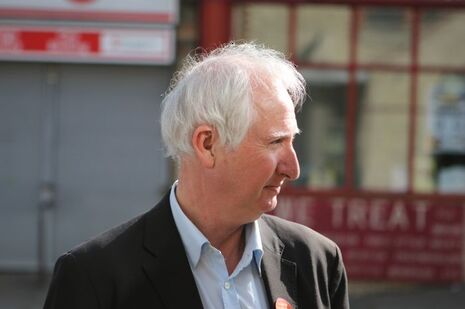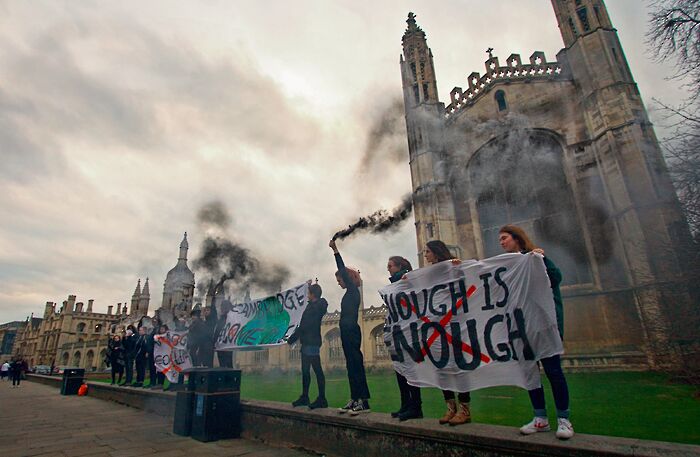MP backs Zero Carbon divestment calls as report day looms for University
Exclusive: Cambridge Zero Carbon Society, Positive Investment Cambridge, and Just Love Cambridge collaborate to deliver report to University’s Divestment Working Group

Three student societies, led by the Cambridge Zero Carbon Society, have joined forces to publish a report detailing how the University can achieve full divestment and positive reinvestment, drawing on examples of institutions that have divested from fossil fuels.
The report, titled Decarbonising Cambridge: A Pathway to Divestment and Positive Reinvestment, was written by a group of 20 students from the Cambridge Zero Carbon Society, Positive Investment Cambridge and Just Love Cambridge, a Christian student community.
The report has been submitted to the University’s Divestment Working Group set up in 2017, set to publish its report on the “pros and cons of divestment” in Lent.
The report, led by Zero Carbon, centres on three key findings, firstly identifying three options for both partial and full divestment from fossil fuels, drawing on successful divestment of other institutions, specifically the Rockefeller Brothers Fund Investment and the universities of California and Bristol. The Rockefeller Brothers Fund Investment reduced the total percentage of financial investments in fossil fuels from 6.6% to 1.7% in 2017. The UC systems divested $200 million in coal and tar sands investments in September 2015, then a further $150 million in response to student protests and sit-ins. It now has approximately 3% of its public equity holdings invested in oil and gas drilling.
In comparison, it was estimated that the University had £377,431,354 invested in fossil fuels in 2014 — 6.4% of its endowment at the time. The figure was then disputed by Andrew Reid, Cambridge’s Director of Finance until January 2018, who claimed it was less than 3.5%. While the University publicly claimed in 2016 that it had no exposure to coal and tar sands in its direct investments, negligible exposure in its indirect holdings and no expectation to invest in such fossil fuels in the future, the Paradise Papers revealed otherwise — Cambridge invested $1.7m (£1.3m) in Coller International, a private equity firm based in Guernsey.
The three pathways to divestment the paper puts forward include transferring investments to an externally-managed fossil-free fund manager, moving global share investments to a low-carbon index, and putting pressure on current fund managers to place a higher emphasis on ESG and present the option of a fully divested fund.
The report also highlights the University’s opportunity to be part of an energy revolution of investors reinvesting their money positively through Green Revolving or Impact Investment Funds, both of which are investment vehicles for organisations to generate beneficial social and environmental impact alongside financial returns.
Lastly, it concludes that the University’s investment procedure is unnecessarily opaque, citing a previous University report into ethical investment which “[failed] to take any meaningful action on the issue.”
Daniel Zeichner, MP for Cambridge, wrote its foreword. Zeichner told Varsity, “The Divestment campaign is an important part of the battle against climate change. As the impact of rising CO₂ emissions becomes too enormous to ignore, it is clear that drastic action is required and at a much faster rate than is being taken now.
“I am very supportive of Cambridge University divesting from the fossil fuel industry and taking a lead on promoting a low carbon economy. It is vital for everyone’s future that our environment is protected, and making that shift away from fossil fuels is a decisive factor in ensuring that we are successful in doing so.”
Two out of the three student groups involved in producing the report have voiced a shared hope that the University will consider divestment a practical and viable prospect in light of the report’s conclusions.
Marcel Llavero Pasquina, campaigns officer at Cambridge Zero Carbon Society, said: “With both academics and students voting for divestment, the question the Working Group is considering has long been resolved. The working group should be reoriented in considering how Cambridge will achieve divestment. Our report provides practical answers to this particular question and highlights the positive potential of a divestment decision. This collaboration not only demonstrates the widespread support for divestment among students but also proves that divestment is plausible, achievable and necessary. With the help of this report the Working Group cannot recommend anything else than full divestment from fossil fuels.”
 News / Colleges charge different rents for the same Castle Street accommodation2 March 2026
News / Colleges charge different rents for the same Castle Street accommodation2 March 2026 News / News in Brief: waterworks, wine woes, and workplace wins 1 March 2026
News / News in Brief: waterworks, wine woes, and workplace wins 1 March 2026 News / Climate activists protest for ‘ethical careers policy’1 March 2026
News / Climate activists protest for ‘ethical careers policy’1 March 2026 News / Angela Merkel among Cambridge honorary degree nominees27 February 2026
News / Angela Merkel among Cambridge honorary degree nominees27 February 2026 News / Private school teacher who lied about Cambridge degree barred from teaching27 February 2026
News / Private school teacher who lied about Cambridge degree barred from teaching27 February 2026










